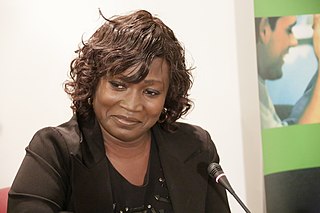
Boubacar Boris Diop is a Senegalese novelist, journalist and screenwriter. His best known work, Murambi, le livre des ossements, is the fictional account of a notorious massacre during the Rwandan genocide of 1994. He is also the founder of Sol, an independent newspaper in Senegal, and the author of many books, political works, plays and screenplays. Doomi Golo (2003) is one of the only novels ever written in Wolof; it deals with the life of a Senegalese Wolof family. The book was published by Papyrus Afrique, Dakar.

Sokhna Benga (Mbengue) is a Senegalese novelist and poet. She writes in French.
The Senegalese education system is based on its French equivalent. The state is responsible for the creation of an educational system that enables every citizen access to education. Articles 21 and 22 of the Constitution adopted in January 2001 guarantee access to education for all children. However, due to limited resources and low demand for secular education in areas where Islamic education is more prevalent, the law is not fully enforced.
The Gayssot Act or Gayssot Law, enacted on 13 July 1990, makes it an offence in France to question the existence or size of the category of crimes against humanity as defined in the London Charter of 1945, on the basis of which Nazi leaders were convicted by the International Military Tribunal at Nuremberg in 1945–1946.

Iba N'Diaye was a French-Senegalese painter. Trained in Senegal and France during the colonial period, N'Diaye utilised European modernist fine arts training and medium to depict his views of African realities. He returned to Senegal upon its independence, and became the founding head of Senegal's national fine arts academy. Disenchanted with the prevailing artistic and political climate of mid-1960s Dakar, N'Diaye returned to France in 1967 and exhibited around the globe, returning to his birthplace of Saint-Louis, Senegal, to present his work in Senegal again only in 2000. N'Diaye died at his home in Paris in October, 2008 at the age of 80.

A talibé is a boy, usually from Senegal, the Gambia, Guinea, Guinea-Bissau, Chad, Mali or Mauritania, who studies the Quran at a daara. This education is guided by a teacher known as a marabout. In most cases talibés leave their parents to stay in the daara.
Demba Diop was a Senegalese politician. He served as Minister of Youth and Sport under President Léopold Sédar Senghor and was Mayor of Mbour from 1966 until his assassination.
Trade unionism is a powerful force in the politics, economy, and culture of Senegal, and was one of the earliest trades union movements to form in Francophone West Africa.
Lord Alajiman is a Senegalese hip hop artist and entrepreneur. He is one of the member of the now internationally known group Daara J with whom he performed and toured throughout the world until 2008 when the group split. Since then, Alajiman evolves in a solo career while contributing to the development of the music sector in Senegal. In 2009, he created Baatine Agency, a communication agency centred on Karbone 14, which repeatedly organised the shows of Morgan Heritage in Dakar. Citing Cheikh Anta Diop, Alajiman claims to understands the development – one oneself or a sector in general – as ”the acceptance of new elements”.

Following an historical process of appropriation of American popular music by Senegal, hip hop emerged in the Senegalese capital city in the early mid- 1980s. Although hip hop galsen is now famous for its diverse musical productions, the movement there spread out from its dancing appeal rather than from its musical one. Indeed, Senegalese hip hop artists initially participated in this movement as smurfer, breakdancer, B-boy in general performing during organised podiums. Schools, nightclubs and other temporary public stages thus played an essential role in amplifying this movement in Dakar. Besides, and in contrast to American hip hop, which grew from the youth in the inner city ghettos, hip hop in Dakar began among a somehow middle-class youth who was able to access and/or introduce in their home place new ideas and new cultural expressions coming from abroad. Indeed, hip hop became popular in the capital city through the intensive through informal circulation of VH7 cassettes and recorded videos, which were imported from USA or France by diaspora people.

Women in Senegal have a traditional social status as shaped by local custom and religion. According to 2005 survey, the female genital mutilation prevalence rate stands at 28% of all women in Senegal aged between 15 and 49.

Sidiki Kaba is a Senegalese politician who served as the 15th Prime Minister of Senegal from 6 March 2024 to 3 April 2024.
Cheikh Hamidou Kane, nicknamed "Mathaira," was a Senegalese politician and economist who served as a government minister several times during Abdou Diouf's presidency. He was a member of the Socialist Party (PS) and later of the Alliance of the Forces of Progress (AFP).
Bécaye Diop is a Senegalese politician, who is a member of the Senegalese Democratic Party (PDS) and has held several ministerial positions.
Marie "Mame" Bassine Niang was a Senegalese lawyer.
Gaëtan Mootoo was a Mauritian human rights activist, researcher responsible for West Africa in the Amnesty International organization.

Codou Bop is a Senegalese sociologist, journalist and women's rights activist who also engages against gender violence in Sub-Saharan Africa.

The African Patriots of Senegal for Work, Ethics and Fraternity, or just Patriots of Senegal, is a Senegalese political party founded in 2014 by Ousmane Sonko.
Amnesty International Belgique francophone is the French-speaking Belgian section of Amnesty International (AIBF).









